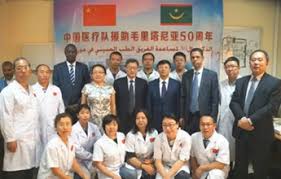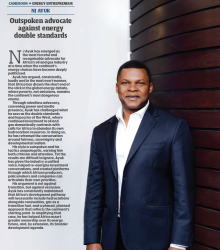In the morning light of Bissau, the capital of Guinea-Bissau, rows of students lined the corridors of a high school, their eyes bright with anticipation. Chinese doctors arrived with lectures, health check-ups, and consultations, bringing the gift of healthcare to more than 1,600 young minds.
In February, the 20th batch of the Chinese medical team in Guinea-Bissau, in cooperation with the West African country’s Ministry of Public Health and Ministry of Education, jointly established the “Health into Schools” program.
Since the program’s official launch on May 20, a team of 14 Chinese doctors specializing in over 10 departments, including pediatrics, gastroenterology, general surgery, dermatology, and cardiology, has already conducted free clinics in five schools in Bissau.
“Guinea-Bissau’s healthcare system is weak, and the health of its adolescent population deserves greater attention,” said Pang Yong, head of the Chinese medical team, at the free clinic site held at Samora Moises Machel High School.
“Most students face challenges during adolescence, including malnutrition, parasitic and skin diseases, as well as limited knowledge about the prevention of sexually transmitted diseases,” Pang said.
He said the main health issues identified during this free clinic included diarrhea, abdominal pain, eye inflammation, malnutrition, skin infections, and respiratory diseases. “These problems are related to factors, such as poor local sanitary conditions, heavy dust during the dry season, bacteria breeding easily during the rainy season, and insufficient nutritional intake.”
Guinea-Bissau has only a few comprehensive hospitals, most of which are concentrated in the capital. Regional hospitals are underdeveloped, community health centers have low coverage, and there is a severe shortage of medical personnel, especially nurses. Infectious diseases like malaria, nutrition-related diseases, chronic illnesses, and parasitic diseases are the main health threats facing the local population.
Orthopedic surgeon Guo Qiang, a team member, offered consultations and participated in health education sessions during the free clinic. Although the country’s medical infrastructure remains rudimentary, he was deeply impressed by the children’s enthusiasm and urgent need for medical care.
“I once treated a three-year-old patient whose left thumb had become severely infected after an injury and was at risk of amputation. When the family was nearly desperate, they contacted me overnight via social media. After treatment, the child’s thumb was ultimately saved,” Guo said. The trust and gratitude in the little boy’s and his family’s eyes deepened his understanding of what “Health into Schools” truly means.
Guo’s experience reflects the broader impact of the free clinic program.
Maria Ines Djassi, 16, had long suffered from abdominal pain and diarrhea, but the long distance to healthcare facilities and the high cost of care had prevented her from receiving effective treatment.
At the site, Chinese doctors carefully assessed her condition, provided education on diarrhea prevention, and offered her free medication.
“I’m truly grateful to the Chinese doctors; their visit means a lot to us,” Maria said. “After attending today’s lecture, I feel inspired to study medicine, especially to become a doctor in the field of public health.”
Abdulai Indjai, 18, had long been troubled by eye discomfort. Chinese doctors identified signs of conjunctivitis and patiently showed him how to care for his eyes properly.
“These small illnesses may not seem serious, but they can really mess up our lives. It means a lot to have someone notice and care,” Abdulai said.
“The Chinese doctors are very professional and patient. They not only gave our students check-ups, but also shared some really helpful medical knowledge,” said Mamadu Lamarana, principal of Samora Moises Machel High School. “Many of our students don’t usually have easy access to healthcare, so getting treatment right here at school is a rare and valuable opportunity.”
Lamarana expressed his deep gratitude to the medical team and voiced hope that more free clinic programs would be brought to schools in the future.
Since 1976, when China dispatched its first medical team at the request of the Guinea-Bissau government, the Asian country has sent a total of 20 batches comprising over 300 medical personnel.
The 20th Chinese medical team arrived in Guinea-Bissau in May 2024. Stationed primarily at the China-Guinea-Bissau Friendship Hospital, they are engaged in clinical services, medical teaching, and community health education. Enditem
Source: Xinhua
Share Us



